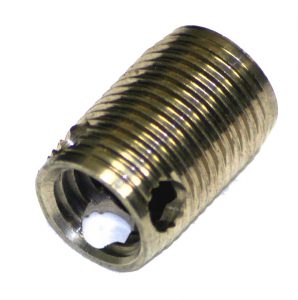
Threaded fasteners are often used in conjunction with a threaded insert to join two or more objects. Also known as threaded bushings, they provided female threaded to support the use of a fastener with male threading, such as a screw or bolt. The threaded insert is embedded inside an object, after which a screw or bolt can be driven into it.
Reasons to Use a Threaded Insert
Threaded inserts are typically used when the object in which a threaded fastener is being installed is made of a soft material. For hard materials, a screw or bolt can be often driven into the object without the need for a threaded insert. For soft materials, however, driving a screw or bolt directly into the object can damage it. A simple solution is to use a threaded insert. The threaded insert is placed inside the object, after which the threaded fastener is driven into the insert.
Another instance in which threaded fasteners are used is when an existing threaded hole is stripped. If the ridges of a threaded hole have degraded to the point where they no longer support or hold a threaded fastener, a threaded insert can be used.
Finally, threaded inserts can be used when an object is too thin to support the full length of a threaded fastener. Some of the threaded insert may protrude out the back of the object, but a screw or bolt can still be driven all the way into it.
The Different Types of Threaded Inserts
All threaded inserts are designed with female threading to support the use of a fastener with male threading, but there are several different types of threaded inserts, each of which features a unique design. Helical threaded inserts, for example, are characterized by a coiled design, typically consisting of steel or bronze. The respective metal is coiled up in the precise size and shape to support the threaded fastener.
There are also captive nut inserts, which consist of a nut wrapped around female threading. Also known as cage nuts, they feature “wings” on the top that dig into the object when a threaded fastener is driven into them. Captive nuts have been around for over a half-century, with the first patent being granted in 1946. Since then, they’ve become a common tool used for wall-mounting applications.
Externally threaded inserts, as the name suggests, feature threading on the exterior. They still have internal threading, but they also have external threading. So, what’s the purpose of this external threading? With external threading, they can be driven into pre-drilled holes with greater ease.
